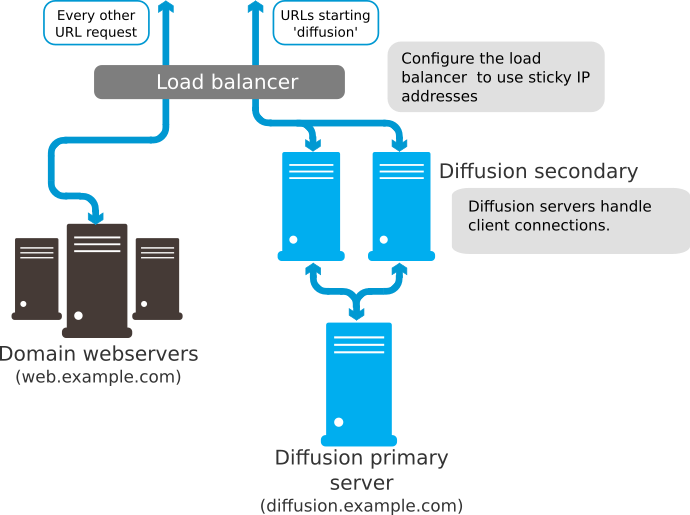Load balancers
We recommend that you use load balancers in your Diffusion™ solution.
Why use load balancers?
- Balancing client traffic across multiple Diffusion servers
- Distribute incoming requests from clients fairly over the Diffusion servers in your solution and ensure that all traffic for a specific client is routed to the same Diffusion server.
- Compositing URL spaces
- If your
Diffusion
servers are located at a
different
URL
to the
Diffusion
browser clients hosted by your web
servers, you can use a load balancer to composite the
URL
spaces. This enables
Diffusion
solutions to interoperate with
browser security.

- Secure Sockets Layer (SSL) offloading
- Diffusion clients can connect to your solution using Transport Layer Security (TLS) or SSL . The TLS / SSL can terminate at your load balancer or at your Diffusion server. Terminating the TLS at the load balancer reduces CPU cost on your Diffusion servers.
Considerations when using load balancers
Do not use connection pooling for connections between the load balancer and the Diffusion server. If multiple client connections are multiplexed through a single server-side connection, this can cause client connections to be prematurely closed.
In Diffusion , a client is associated with a single TCP / HTTP connection for the lifetime of that connection. If a Diffusion server closes a client, the connection is also closed. Diffusion makes no distinction between a single client connection and a multiplexed connection, so when a client sharing a multiplexed connection closes, the connection between the load balancer and Diffusion is closed, and subsequently all of the client-side connections multiplexed through that server-side connection are closed.
Multiple users masquerading behind a proxy or access point can have the same IP address, and all requests from clients with that IP address are routed to the same Diffusion instance. Load balancing still occurs, but some hosts might be unfairly loaded.